新概念英语第二册第45课.Lesson-45--A-clear-conscience
- 格式:ppt
- 大小:359.00 KB
- 文档页数:18
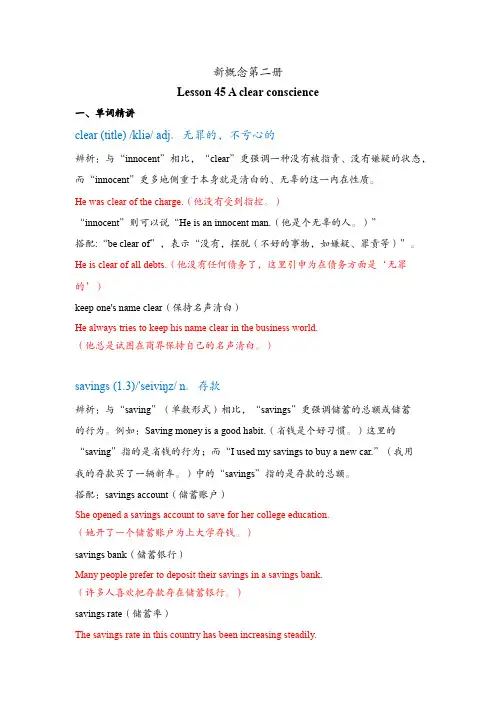
新概念第二册Lesson 45 A clear conscience一、单词精讲clear (title) /kliə/ adj.无罪的,不亏心的辨析:与“innocent”相比,“clear”更强调一种没有被指责、没有嫌疑的状态,而“innocent”更多地侧重于本身就是清白的、无辜的这一内在性质。
He was clear of the charge.(他没有受到指控。
)“innocent”则可以说“He is an innocent man.(他是个无辜的人。
)”搭配:“be clear of”,表示“没有,摆脱(不好的事物,如嫌疑、罪责等)”。
He is clear of all debts.(他没有任何债务了,这里引申为在债务方面是‘无罪的’)keep one's name clear(保持名声清白)He always tries to keep his name clear in the business world.(他总是试图在商界保持自己的名声清白。
)savings (1.3)/'seiviŋz/ n.存款辨析:与“saving”(单数形式)相比,“savings”更强调储蓄的总额或储蓄的行为。
例如:Saving money is a good habit.(省钱是个好习惯。
)这里的“saving”指的是省钱的行为;而“I used my savings to buy a new car.”(我用我的存款买了一辆新车。
)中的“savings”指的是存款的总额。
搭配:savings account(储蓄账户)She opened a savings account to save for her college education.(她开了一个储蓄账户为上大学存钱。
)savings bank(储蓄银行)Many people prefer to deposit their savings in a savings bank.(许多人喜欢把存款存在储蓄银行。


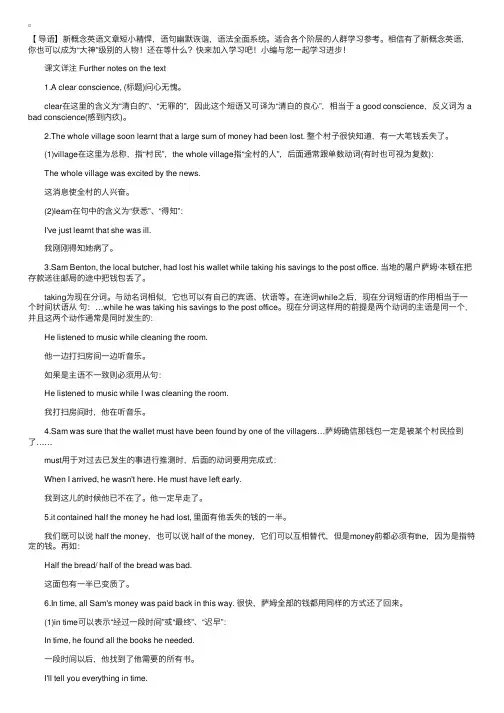
【导语】新概念英语⽂章短⼩精悍,语句幽默诙谐,语法全⾯系统。
适合各个阶层的⼈群学习参考。
相信有了新概念英语,你也可以成为“⼤神”级别的⼈物!还在等什么?快来加⼊学习吧!⼩编与您⼀起学习进步! 课⽂详注 Further notes on the text 1.A clear conscience, (标题)问⼼⽆愧。
clear在这⾥的含义为“清⽩的”、“⽆罪的”,因此这个短语⼜可译为“清⽩的良⼼”,相当于 a good conscience,反义词为 a bad conscience(感到内疚)。
2.The whole village soon learnt that a large sum of money had been lost. 整个村⼦很快知道,有⼀⼤笔钱丢失了。
(1)village在这⾥为总称,指“村民”,the whole village指“全村的⼈”,后⾯通常跟单数动词(有时也可视为复数): The whole village was excited by the news. 这消息使全村的⼈兴奋。
(2)learn在句中的含义为“获悉”、“得知”: I've just learnt that she was ill. 我刚刚得知她病了。
3.Sam Benton, the local butcher, had lost his wallet while taking his savings to the post office. 当地的屠户萨姆·本顿在把存款送往邮局的途中把钱包丢了。
taking为现在分词。
与动名词相似,它也可以有⾃⼰的宾语、状语等。
在连词while之后,现在分词短语的作⽤相当于⼀个时间状语从句:…while he was taking his savings to the post office。
现在分词这样⽤的前提是两个动词的主语是同⼀个,并且这两个动作通常是同时发⽣的: He listened to music while cleaning the room. 他⼀边打扫房间⼀边听⾳乐。

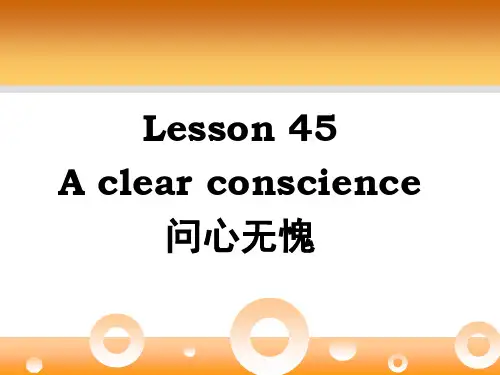
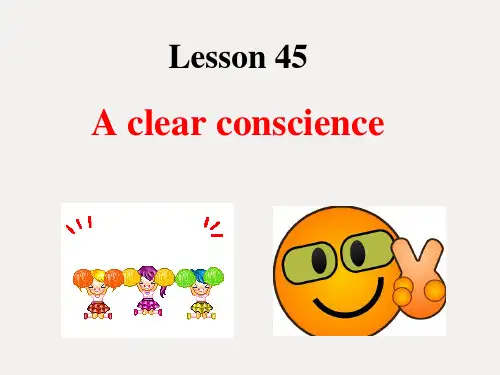
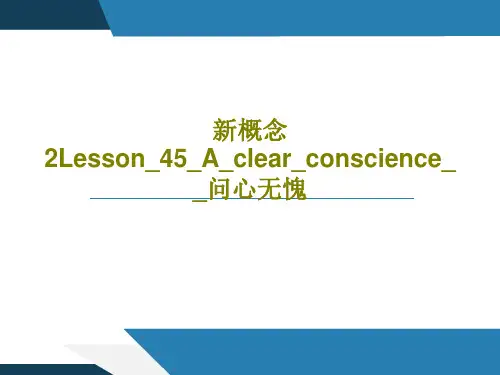
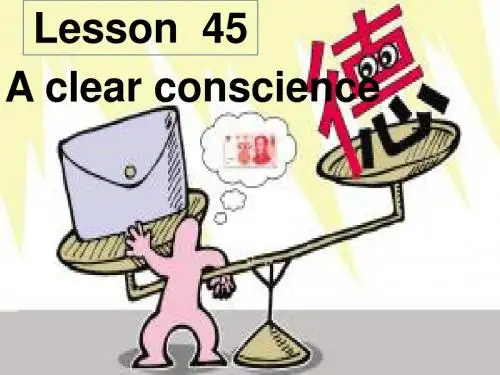

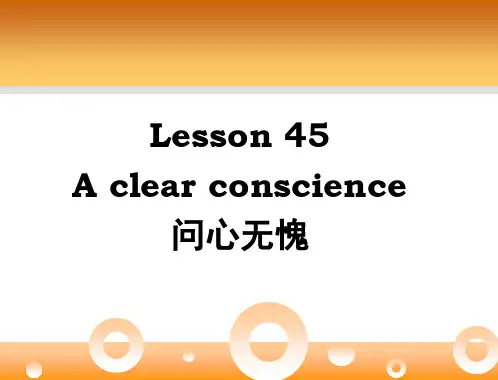
A clear conscience问心无愧-新概念英语第二册自学导读笔记第45课新概念英语第二册第45课课文重难点 further notes on the text1.a clear conscience, (标题)问心无愧。
clear在这里的含义为"清白的"、"无罪的",所以这个短语又可译为"清白的良心",相当于 a good conscience,反义词为 a bad conscience(感到内疚)。
2.the whole village soon learnt that a large sum of money had been lost. 整个村子很快知道,有一大笔钱丢失了。
(1)village在这里为总称,指"村民",the whole village指"全村的人",后面通常跟单数动词(有时也可视为复数):the whole village was excited by the news.这消息使全村的人兴奋。
(2)learn在句中的含义为"获悉"、"得知":i've just learnt that she was ill.我刚刚得知她病了。
3.sam benton, the local butcher, had lost his wallet while taking his savings to the post office. 当地的屠户萨姆·本顿在把存款送往邮局的途中把钱包丢了。
taking为现在分词。
与动名词相似,它也能够有自己的宾语、状语等。
在连词while之后,现在分词短语的作用相当于一个时间状语从句:…while he was taking his savings to the post office。
现在分词这样用的前提是两个动词的主语是同一个,并且这两个动作通常是同时发生的:he listened to music while cleaning the room.他一边打扫房间一边听音乐。